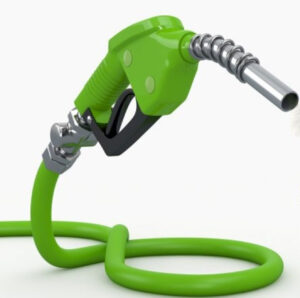When you pull up to a gas station, you’re met with choices at the pump. There are several fuel options that are designed to meet the needs of a variety of vehicles. You should check the owner’s manual to determine what type of fuel is recommended. We’ve compiled information on different fuel types you might encounter at the gas pump in order to help you make the right choice for your vehicle.
Gasoline
Gasoline is the most common fuel found at gas pumps around the world. It’s a liquid fuel derived from crude oil through a refining process. Gasoline comes in different octane ratings, typically 87 (regular), 89 (mid-grade), and 91 or higher (premium). Higher octane ratings are often used in high-performance or turbocharged engines to prevent knocking and to improve performance. The knocking sounds occur when the air-fuel mixture detonates prematurely in the engine. Most standard cars run well on regular gasoline. Your vehicle’s manual should provide information regarding the recommended grade of gasoline. Using a higher grade than needed typically does nothing to improve your vehicle’s performance, but fueling your car with a lower grade of gasoline over a long period of time can damage your engine.
Diesel
Diesel fuel is recognized by its distinctive green pump handles. Diesel engines are known for their fuel efficiency and torque, and they are common in trucks and heavy-duty vehicles. Diesel fuel is less refined than gasoline and is made from heavier hydrocarbons. It contains more energy per gallon and is often associated with better fuel economy, but diesel engines can produce higher emissions of nitrogen oxides (NOx) and particulate matter. Diesel should never be used in a car that runs on gasoline because it could cause the engine to seize.
E85 (Ethanol)
E85 is an alternative fuel made up of 85% ethanol and 15% gasoline. Ethanol is typically derived from corn and is considered a more environmentally friendly option due to its renewable source. However, not all vehicles can run on E85. Flex-fuel vehicles (FFVs) are designed to use E85 or gasoline interchangeably. While E85 can reduce greenhouse gas emissions, it can also result in decreased fuel economy because ethanol contains less energy per gallon than gasoline. According to JD Power, “using flex-fuel in a vehicle that’s not rated for it can cause severe damage. The ethanol can dry out your fuel lines, O-rings, and other plastic components and can even void your warranty.”
Alternative Fuel Types
There are some alternative fuel types available that provide a greener way to operate vehicles. The Maryland Department of the Environment offers programs and resources to educate Maryland residents on these environmentally friendly options. Here is some information about these fuel types:
Biodiesel
Biodiesel is another eco-friendly fuel made from renewable sources such as vegetable oil or animal fat. It is often blended with regular diesel fuel to create B5 (5% biodiesel) or B20 (20% biodiesel). Biodiesel can reduce carbon emissions and is less polluting than traditional diesel. However, like E85, not all vehicles can use biodiesel, and it may have a slightly different energy content. Here is a list of stations that offer biodiesel in Maryland.
Compressed Natural Gas (CNG)
Compressed Natural Gas (CNG) is a clean-burning alternative to gasoline and diesel. It’s made up of methane and is stored at high pressure in special tanks in a vehicle. CNG vehicles emit fewer greenhouse gases and pollutants compared to traditional fuels. However, CNG vehicles have limited availability and may require modifications to your vehicle, making them less common among everyday drivers. Here is a map of places to get CNG in Maryland.
Electric Charging Stations
In the quest for cleaner and more sustainable transportation, electric vehicles (EVs) have gained popularity. Instead of liquid fuels, EVs use electricity stored in batteries to power electric motors. Charging stations for EVs are becoming more prevalent, allowing drivers to “fuel up” with electricity rather than gasoline or diesel. Here is a list of charging stations from the Maryland Transportation Authority.
No matter how you fuel your vehicle, you should always follow the manufacturers recommendations to safely and efficiently operate your car.
For more information on different fuel types, go to:
- Types of Gasoline Explained: Learn the Differences – Kelley Blue Book
- Guide to Different Types of Gasoline – J.D. Power
- Diesel vs. Gasoline: Everything You Need to Know – Car and Driver Magazine
- Diesel fuel explained – U.S. Energy Information Administration (EIA)
- Alternative Fuels Data Center: Biodiesel Fuel Basics – U.S. Department of Energy




